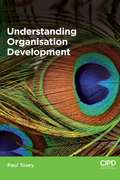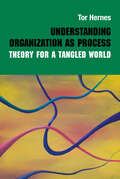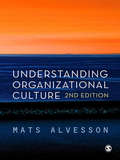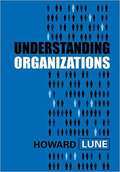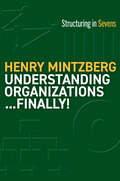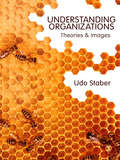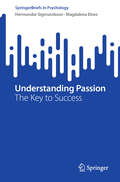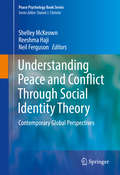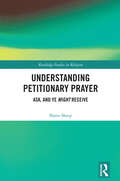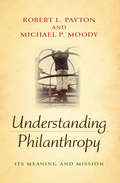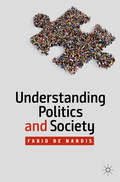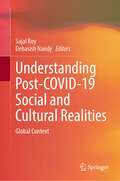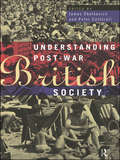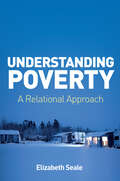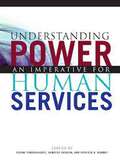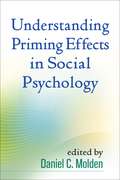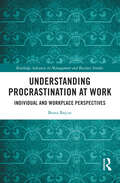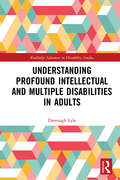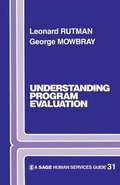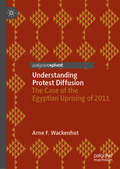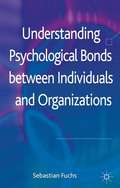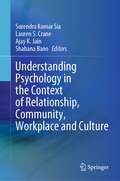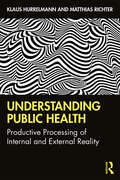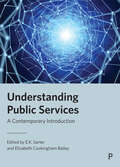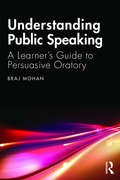- Table View
- List View
Understanding Organisation Development
by Paul ToseyUnderstanding Organisation Development is essential reading for students studying Organisation Development (OD) as part of a wider HR degree or professional qualification, is the core textbook for the CIPD level 5 Unit 5UOD, and is ideal for professionals looking for a solid theoretical grounding that they can apply in practice. With a clear and accessible format, it will enable readers to understand and analyse the concept of Organisation Development (OD) and its relationship with learning and development (L&D), and develop their understanding of the evolution of OD in contemporary organisations and its role in contributing to major organisational change.Working step-by-step through the broad framework of OD, Understanding Organisation Development takes the reader through its concept and purposes, historical development, the relationship between OD and HRM, the different models of OD and the common processes involved. This essential text will give you a thorough understanding of the knowledge, skills and behaviours required to function effectively in an OD practitioner role.
Understanding Organization as Process: Theory for a Tangled World (Routledge Studies In Management, Organizations And Society Ser.)
by Tor HernesOrganization takes place in a tangled world, intermeshed by changing markets, products, standards, technologies, institutions and social groups. Coming to grips with the complexity and fluidity of organization and management is a persistent problem for scholars and practitioners alike, which is why process issues have received renewed interest in r
Understanding Organizational Culture (Organizational Culture Ser.)
by Mats AlvessonUnlike prescriptive books about organizations, Understanding Organizational Culture challenges and provokes the reader to think critically. It provides an insight into organizational culture, aided by numerous empirical illustrations from ethnographic studies that develop and illustrate how cultural thinking can be used in managerial and non-managerial organizational theory and practice. <P><P> Mats Alvesson answers questions of definition, explores alternative perspectives and exands on substantive issues, before discussing key issues of research and developing his framework. Further more, the advances in the field of organizational culture are synthesized for the reader by drawing upon the range of relevant literature within organization studies. <P> Understanding Organizational Culture provides great breadth within a textbook approach - covering a wide spectrum of management and organization while at the same time developing a new theoretical approach to organizational culture. The new edition contains improved pedagogy and expanded coverage of topics such as identity and organizational change.<P> It is essential reading for students taking undergraduate and postgraduate modules in Organizational Behaviour and Organizational Theory on Management and Organization Studies programmes, including MBA.
Understanding Organizations
by Howard LuneSocial life is a collective process, and virtually all of social life in contemporary industrial nations is shaped by formal organizations and recognized social institutions. One can no longer hope to understand a complex society without understanding its organizations, any more than one can fully understand organizational life without grasping the social processes that shape it. <p><p> Understanding Organizations takes a fresh look at the sociology of organizations, blending classic theories of industrial society with contemporary cultural studies, labor studies, social movement theory, and the role of nonprofits. In each chapter, Lune describes the major ideas and the new work that define the topic, as well as asking how these assumptions came about and how they impact us in our daily lives. <p><p> This book will be the ideal companion to courses on organizations across the social sciences, and has insights to offer all students of organized life, whether one is interested in entering the corporate world, starting an arts organization, or mobilizing for social change.
Understanding Organizations...Finally!: Structuring in Sevens
by Henry MintzbergThe iconic Henry Mintzberg provides a crystal-clear map to the forms and forces that shape all human organizations, synthesizing his fifty years of research.We live in a world of organizations, from our birth in hospitals until our burial by funeral homes. In between, we are educated, employed, entertained, and exasperated by organizations. We had better understand how these strange beasts really work. But where can we go to find out? Welcome to Understanding Organizations . . . Finally! For half a century, Mintzberg has been observing organizations, advising them, engaging them, and escaping them. Here he offers a masterful update and revision of his 1983 classic, Structure in Fives.Believing there is one best way to structure organizations is the worst way to do so. A better place to start is by recognizing different species of organizations. Mintzberg identifies seven-personal enterprises, programmed machines, professional assemblies, project pioneers, and others. He explores these forms and the seven forces that drive them toward hybrids and across their life cycles. You will find no better guide to the care and feeding of these extraordinarily varied and vital creatures than this book.
Understanding Organizations: Theories and Images
by Udo StaberUnderstanding Organizations: Theories and Images introduces students to the key principles of understanding, designing, and managing organizations in an accessible and practical way. The book provides a conceptual toolkit containing the essential models, theories and concepts needed for working in, managing and evaluating organizations. Key Features: Insightful anecdotes discuss how for- and not-for profit organizations fit within our current society from a social and economic perspective. Theoretical framework and multi-perspective approach focuses on economics, institutionalism and evolution theory highlighting the relationship between organizations, employees and the broader society. Research-focused approach analyses organizational phenomena in light of recent studies. This textbook is ideal for undergraduates and postgraduates studying general management, organizational theory, organizational design, and organizational sociology.
Understanding Passion: The Key to Success (SpringerBriefs in Psychology)
by Hermundur Sigmundsson Magdalena ElnesThis book explores the concept of 'Passion' as a strong motivational force that can increase well-being and quality of life. The authors focus on the importance of having passion in various areas of life, to increase well-being, life satisfaction, and promote meaning in life. They go on to present how we can find and increase passion, supported by various psychological theories and research. Finally, the authors connect passion to expertise. They argue that it is essential to maintain passion during the process that leads to expertise, which is characterized as a long and demanding process that can be associated with negative consequences.
Understanding Peace and Conflict Through Social Identity Theory
by Neil Ferguson Shelley Mckeown Reeshma HajiThis volume brings together perspectives on social identityand peace psychology to explore the role that categorization plays in both conflictand peace-building. To do so, it draws leading scholars from across the worldin a comprehensive exploration of social identity theory and its application tosome of the world's most pressing problems, such as intrastate conflict,uprising in the middle east, the refugee crisis, global warming, racism and peace building. A crucial theme of thevolume is that social identity theory affects all of us, no matter whether weare currently in a state of conflict or one further along in the peace process. The volume is organized into two sections. Section 1 focuseson the development of social identity theory. Grounded in the pioneering workof Dr. Henri Tajfel, section 1 provides the reader with a historical backgroundof the theory, as well as its current developments. Then, section 2 bringstogether a series of country case studies focusing on issues of identity acrossfive continents. This section enablescross-cultural comparisons in terms of methodology and findings, and encouragesthe reader to identify general applications of identity to the understanding ofpeace as well as applications that may be more relevant in specific contexts. Taken together, these two sections provide a contemporary and diverse accountof the state of social identity research in conflict situations and peacepsychology today. It is evident thatany account of peace requires an intricate understanding of identity both as acause and consequence of conflict, as well as a potential resource to beharnessed in the promotion and maintenance of peace. Understanding Peace and Conflict Through Social Identity Theory: ContemporaryGlobal Perspectives aims to helpachieve such an understanding and as such is a valuable resource to thosestudying peace and conflict, psychologists, sociologists, anthropologists,public policy makers, and all those interested in the ways in which socialidentity impacts our world.
Understanding Petitionary Prayer: Ask, and Ye Might Receive (Routledge Studies in Religion)
by Shane SharpThis book explores the “whats,” “whys,” and “hows” of petitionary prayer. Millions of people every single day ask God or some other supernatural being to make some outcome or event happen, whether it be to keep their children safe during a road trip, to give them the willpower to avoid succumbing to the temptation of alcohol, or to help them find a job. The chapters in this volume draw on 130 in-depth interviews conducted in the United States, including non-Christian believers. The author provides extensive documentation and analyses of believers’ experiences and beliefs regarding petitionary prayer. He explores what outcomes believers feel they can legitimately seek through petitionary prayer, how people use petitionary prayer to persuade supernatural beings to make outcomes and events happen, why they believe petitionary prayer is actually effective, and why they believe their prayers went “unanswered.” Studying prayer in general and petitionary prayer in particular is an important part of describing and understanding people’s religious lives. The book will be of interest to scholars and students of religious studies, the sociology of religion, the psychology of religion, social psychology, and symbolic interactionism.
Understanding Philanthropy: Its Meaning and Mission (Philanthropic and Nonprofit Studies)
by Michael P. Moody Robert L. Payton&“A fine volume on the moral meaning and function of philanthropy…makes the case that philanthropy is essential to democratic society.&”—Choice Philanthropy has existed in various forms in all cultures and civilizations throughout history, yet most people know little about it and its distinctive place in our lives. Why does philanthropy exist? Why do people so often turn to philanthropy when we want to make the world a better place? In essence, what is philanthropy? These fundamental questions are tackled in this engaging and original book. Written by one of the founding figures in the field of philanthropic studies, Robert L. Payton, and his former student sociologist Michael P. Moody, Understanding Philanthropy presents a new way of thinking about the meaning and mission of philanthropy. Weaving together accessible theoretical explanations with fascinating examples of philanthropic action, this book advances key scholarly debates about philanthropy and offers practitioners a way of explaining the rationale for their nonprofit efforts.
Understanding Politics and Society
by Fabio de NardisThis textbook presents political sociology as a connective social science that studies political phenomena by creating fruitful connections with other perspectives. The relationship between politics and society is more complex than ever due to the emergence of new power structures, forms of conflict organization and management, and social practices of political participation. Several scholars describe this historical phase as the 'de-politicization of representative politics'. The book addresses classical themes of and approaches to political sociology, but also dedicates several chapters to contemporary developments within political sociology, including, for instance, the role of the internet and bottom-up political communication in social movements. In addition, the volume acts as a professional tool for those scholars and researchers that are beginning to study political processes from a sociological perspective.
Understanding Post-COVID-19 Social and Cultural Realities: Global Context
by Sajal Roy Debasish NandyThis book concentrates on the changing patterns of work and global social order as a result of COVID-19. It scrutinizes these changes in order to point out the possible reasons for these changes following COVID-19. It sheds light on the differences between the condition of underdeveloped and developed countries, focusing on how they struggle to find ways of coping. The pandemic has changed the global social order. It has an impact on every aspect of life around the globe, from individual relationships to institutional operations and international collaborations. Societies are endeavoring to protect themselves despite severe restrictions, while the pandemic continues to upset family relations and overturn governance. COVID-19 has made it clearer than ever before that where many strains on the social sector occur, the current global system, with its interconnectedness and vulnerabilities, is under threat. Due to the changing patterns of economic and societal elements caused by COVID-19, further research is urgently needed to analyze these changing trends. The book portrays what work and the global social order will look like in the future. It is essential reading for anyone interested in these changes and the pst-COVID-19 reality.
Understanding Post-War British Society
by Peter Catterall James ObelkevichToo many sociology textbooks begin and end with how society is structured. To understand how society operates it is necessary to explore not only its constituent structures and relationships, but how these structures emerge and why changes occur within them. By bringing together a group of distinguished sociologists and social historians, this book critically appraises the usefulness of current theories in advancing our understanding of contemporary society. It explores British society as dynamic and developing. In the process the authors draw our attention to the fact that society is shaped not just by social policy and structures, but by how far these influence people's life-patterns, attitudes, experience and conduct. Celia Brackenridge (Cheltenham & Gloucester College of Higher Education, Joan C Brown, Robert G Burgess (University of Warwick), Rosemary Crompton (University of Kent), John Curtice (University of Str
Understanding Poverty: A Relational Approach
by Elizabeth SealePeople in poverty suffer daily under misconceptions about economic hardship and its causes. Providing the most comprehensive consideration to date of poverty in the United States, Elizabeth Seale tackles how we think about issues of culture, behavior, and poverty, cutting straight to the heart of debates about social class. The book addresses tough questions, including how being poor affects individual behavior, and how we can make sense of that in a larger social and political context. The central premise is that to understand the behavior and lives of people in poverty, one must consider their relational context, especially relations of vulnerability and the human need for dignity. Poverty is a social problem we should address as a society by changing social relations that, as a matter of course, cause unnecessary and immense suffering. To do so, we must directly confront our lack of regard for people in poverty by recognizing that they are in fact worthy of an effort to induce major social change. This critical introduction to poverty will be an important read for undergraduate students and above in sociology wanting to learn more about the growing social problems of poverty, inequality, and stratification.
Understanding Power: An Imperative For Human Services
by Elaine PinderhughesUnderstanding Power: An Imperative for Human Services presents basic concepts explaining the multilevel, bidirectional, and recursive operation of power, its effects, and the thinking needed for effective intervention. This resource offers an opportunity to work toward building a metaview from which to address how power operates when it is just and to discover its potential for healing and helping people to find, discover, reclaim, or enhance their own power.
Understanding Priming Effects in Social Psychology
by Daniel C. MoldenHow incidentally activated social representations affect subsequent thoughts and behaviors has long interested social psychologists. Recently, such priming effects have provoked debate and skepticism. Originally a special issue of Social Cognition, this book examines the theoretical challenges researchersmust overcome to further advance priming studiesand considers how these challenges can be met. Thevolume aims to reduce the confusion surrounding current discussions by more thoroughly considering the many phenomena in social psychology that the term "priming" encompasses, and closely examining the psychological processes that explain when and how different types of priming effects occur.
Understanding Procrastination at Work: Individual and Workplace Perspectives (ISSN)
by Beata BajcarUnderstanding Procrastination at Work focuses primarily on procrastination in the workplace, and offers a synthetic and comprehensive review of major theoretical concepts and empirical findings on general procrastination and its specific manifestations, causes, and consequences in the workplace. Building on theoretical insights and empirical research, the monograph proposes and empirically verifies an expanded conceptual framework that integrates individual and work-related factors that contribute to work procrastination and mechanisms explaining this phenomenon. It sits at the intersection of two disciplines, integrating psychological and management knowledge so that a wider audience may benefit from its content. It thus sheds more light on sources and explanatory mechanisms underlying procrastination as a universal behavior in the work setting, with meaningful implications for individuals and organizations alike. Overall, the monograph can serve as a contemporary compendium of knowledge that enables the scientific community and organizational practitioners to better understand procrastination behavior and its implications in professional settings. From the theoretical and empirical perspectives, the monograph provides practical cues to develop prevention and intervention strategies to effectively address and manage procrastination and enhance employee productivity in the organization.
Understanding Profound Intellectual and Multiple Disabilities in Adults (Routledge Advances in Disability Studies)
by Dreenagh LyleThis book explores what happens to people with profound intellectual and multiple disabilities (PIMD) when they reach adulthood. It provides an examination of various terms and definitions in use and a critical exploration of current UK policies. The author brings a wealth of many years’ experience as a family carer, independent consultant and trainer to demonstrate the significant changes that a person-centred, specialised therapeutic and incremental approach can make to an individual’s life. Advances in medical science mean more than ever, people with (PIMD) are growing into adulthood. What is this experience like for an adult who needs support in all aspects of their life? How do we include them in planning support when their intellectual disability means they cannot tell us first hand, what they want or need? Too often this group are overlooked or considered as an afterthought in policy and planning. Notions of independence, employment and mainstream inclusion are all problematic policy ideas for this group of people. Within one-size-fits-all service planning this focus means there is less capacity to meet their life-long specialist, complex and individualised needs. Understanding Profound and Intellectual and Multiple Disabilities in Adults is essential reading for anyone who is involved in the lives of adults with profound intellectual and multiple disabilities, whether as a researcher, student, carer or policy-maker.
Understanding Program Evaluation, Sage Human Services Guides, Volume 31
by Leonard Rutman George Mowbray"This is an interesting monograph and one which should be useful for the intended audience of program managers and students . . . particularly in respect to the emphasis placed on the utilization of evaluation information for management purposes and the need to tailor evaluations to meet this primary purpose." --Canadian Evaluation Society Newsletter
Understanding Protest Diffusion: The Case of the Egyptian Uprising of 2011
by Arne F. WackenhutThis book traces the mobilization process leading up to the January 25 Uprising, and furthers our understanding of the largely unexpected diffusion of protest during this Egyptian Revolution. Focusing on the role of the so-called “Cairo-based political opposition,” this study strongly suggests a need to pay closer attention to the complexity and contingent nature of such large-scale protest episodes. Building on interviews with activists, employees of NGOs in the human rights advocacy sector, and journalists, this in-depth single case study reveals how different movement organizations in the Egyptian prodemocracy movement had long, and largely unsuccessfully, tried to mobilize support for socio-political change in the country. Against this backdrop, the book illustrates how a coalition of activists sought to organize a protest event against police brutality in early 2011. The resulting protests on January 25 surprised not only the regime of Hosni Mubarak, but also the organizers.
Understanding Psychological Bonds between Individuals and Organizations
by Sebastian FuchsOrganizations operating in competitive environments habitually seek ever-new avenues to increase and optimize the performance of their individual employees. One popular device to increase employees' performance, especially those elements of performance that are left to the discretion of an individual, refers to the idea of creating a strong, meaningful psychological bond between an individual and an organization. Understanding Psychological Bonds between Individuals and Organizations looks at precisely this device and proposes a novel, integrated and comprehensive model which investigates the different mechanisms that help to explain such psychological bonds.
Understanding Psychology in the Context of Relationship, Community, Workplace and Culture
by Surendra Kumar Sia Lauren S. Crane Ajay K. Jain Shabana BanoThis book explores the significant deliverables of psychology to society in five sections: identity and relationship, psychology for gainful employment, psychology customized to the community, culturally embedded psychology and alternatives for maximizing psychology. The authors, social scientists of diverse nationalities, represent novel psychological methods, tools and procedures that can have immense social utility in strengthening the relationship and rejuvenating the community. The first section offers an in-depth perspective on the dynamics between identity and relationship. The second section encompasses psychology's contribution in addressing community-based issues like farmer suicide, cyberbullying, smartphone overuse, substance abuse and collective environmental behaviour. The authors in the third section have deliberated upon the behavioural issues pertinent for gainful employment. The fourth section delineates the influence of culture on specific psychological processes. The last section touches upon means beyond conventional strategies, techniques and approaches that may augment psychology's deliverability. The chapters in this book are based upon evidence-based scholarships from seven different countries. As such, it represents an invaluable resource for research scholars and academicians in psychology, human resource managers and mental health practitioners.
Understanding Public Health: Productive Processing of Internal and External Reality
by Matthias Richter Klaus HurrelmannThis book develops a new model of the genesis of health, on the basis of the interplay between genetic and environmental factors. Hurrelmann and Richter build upon the basic theories of health and the popular model of salutogenesis to offer a comprehensive interdisciplinary theory of health genesis and success: Productive Processing of Reality (PPR). The authors show that health is the lifelong dynamic process of dealing with the internal reality of physical and psychological impulses and the external reality of social and material impulses. To demonstrate this, the book is split into three interconnected parts. Part A analyses the determinants of health, providing an overview of the insights of current research and the impact of socioeconomic influences and gender on health. Part B covers public health, social, learning and coping theories, all of which understand health as an interaction between people and their environment. Part C draws on these four theories to outline PPR, stressing the interrelation between physical and mental constitution and the demands of the social and mental environment, and suggesting strategies for coping with these demands during the life course. Understanding Public Health: Productive Processing of Internal and External Reality will be valuable reading for students and researchers in psychology, sociology, educational science, public health and medical science, and for policymakers in public health.
Understanding Public Services: A Contemporary Introduction
by E.K. Sarter and Elizabeth Cookingham BaileyDive inside this textbook for an accessible guide to the discipline of public services. Perfect for students, it offers a comprehensive account of core public service topics and explains the fundamental elements of working in the public services. Outlining their role in the welfare state, it explores the policies, providers and legalities shaping the context in which public services operate. Students will study concepts of organisational change, strategy, management, leadership and funding, and engage with timely discussions around contemporary public issues such as equality, sustainability and climate change. Key features to support student learning include: • objectives at the beginning of each chapter; • case studies and examples; • end of chapter summaries; • reflective questions; • further reading recommendations and resources. Bringing together authors with expertise in politics and public policy, social policy and law, this book is essential reading for everybody studying public services.
Understanding Public Speaking: A Learner's Guide to Persuasive Oratory
by Braj MohanPublic speaking is a much coveted yet difficult art. This book illustrates the use of various linguistic devices and persuasive strategies with examples from the speeches of powerful orators in history. It systematically draws on the various approaches to public speaking and persuasive discourse to present new insights and techniques. The volume: Critically examines strategies of persuasive oratory. Draws on extensive investigation of a corpus of famous public speeches in history. Focuses on the needs of those who want to brush up their public speaking skills. The volume will be a key reference for aspiring civil servants, lawyers, business and corporate professionals, and politicians. It will be of great interest to scholars of linguistics, and political and business communication.
